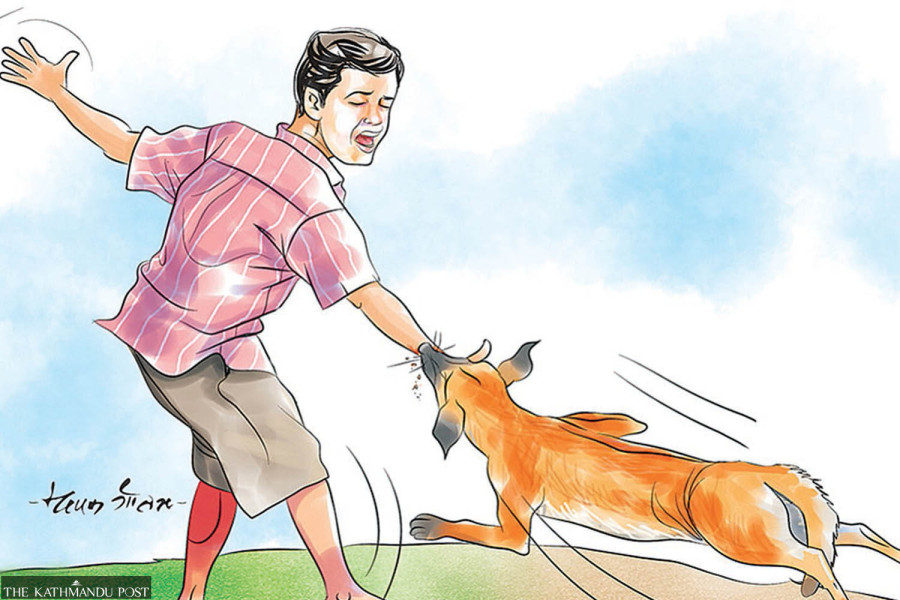Lumbini Province
Vaccine crisis in Lumbini province drives dog bite victims to Indian hospitals
Federal government supplies anti-rabies vaccines for free, but last year only 1,160 vials of the vaccine were sent to Lumbini, while the demand exceeds 69,000.
Madhav Dhungana
A stray dog bit Ramlakhan Kewat, a resident of ward 4 of Marchawari Rural Municipality in Rupandehi district, while he was walking down a street last week. He rushed to Rayapur primary health centre, hoping to get an anti-rabies vaccine, only to find that the vaccine was out of stock. He then hurried to Bhairahawa-based Bhim Hospital, but was turned away there too, as they too had no vaccines.
“I visited several health institutions in the area looking for the anti-rabies vaccine. I had no option but to visit the Indian town of Nautanwa across the border, to get the shot,” said Kewat. “There were many others like me who visited Nautanwa as the vaccines were unavailable at public hospitals in Rupandehi.”
Bhim Hospital, also known as the district hospital of Rupandehi, sees around 50 people a day seeking anti-rabies vaccines. But due to a severe shortage, dog bite victims are compelled to visit private health institutions or travel to bordering Indian towns for the vaccine.
“Our hospital has been out of anti-rabies vaccines for the past three weeks. The vaccines are only supplied once a year, in January or February, and we have had to turn people away due to the shortage,” said Ishwari Gyawali, administration chief at the hospital.
The federal government provides anti-rabies vaccines at free of cost. In Lumbini Province, 40 health institutions in 12 districts get the vaccines. These are allocated and distributed through the Lumbini province health logistics management centre in Butwal.
But the centre is currently unable to supply the vaccines because of a shortage. “We only have a very small stock of anti-rabies vaccines for emergencies. We don’t have any available for distribution,” said Hari Acharya, an officer at the centre. According to him, almost all the health institutions in the district are asking for anti-rabies vaccines.
The Ministry of Health and Population supplies the anti-rabies vaccines through the Epidemiology and Disease Control Division. The Lumbini province health logistics management centre has been asking the division for vaccines since September, but to no avail.
According to Acharya, the division supplied 1,160 vials to the centre in the last fiscal year, 2023-24. “We also had a total of 12,125 vials of anti-rabies vaccines in stock last year. We supplied them to health institutions until October third week, and since then, we haven’t been able to get more,” he said.
Acharya estimates that around 69,240 vials of anti-rabies vaccines are required annually in 40 designated health institutions of Lumbini Province. The supply has been far below the demand and this forces dog bite victims to seek the vaccines at private health institutions, where the cost is high. A full course of three doses can cost around Rs25,000 at private health institutions.
Moreover, anti-rabies vaccines are not easily available at private health institutions, as they are expensive and as they are offered for free at government health institutions. As a result, the people are forced to travel from place to place to find the vaccine.
“We generally don’t keep anti-rabies vaccines as they are freely available at public health institutions. People rarely buy them. But over the past two months, many people have been visiting us for the vaccine,” said Pramod Gyawali, owner of Sijal Pharmacy in ward 9 of Siddharthanagar Municipality.
The Epidemiology and Disease Control Division acknowledges the shortage and its impact on service seekers. Dr Yadu Chandra Ghimire, director at the division, said that there was shortage of anti-rabies vaccines as last year’s stock quickly ran out, and the new procurement process was yet to begin.
“We will supply the vaccines soon. In the last fiscal year, Rs130 million was allocated for the procurement. This year, we have doubled the budget to meet the increased demand,” said Ghimire.
Dog bite incidents have been rising across the country of late, especially among those who emerge from their houses on their morning walks.




 22°C Kathmandu
22°C Kathmandu













